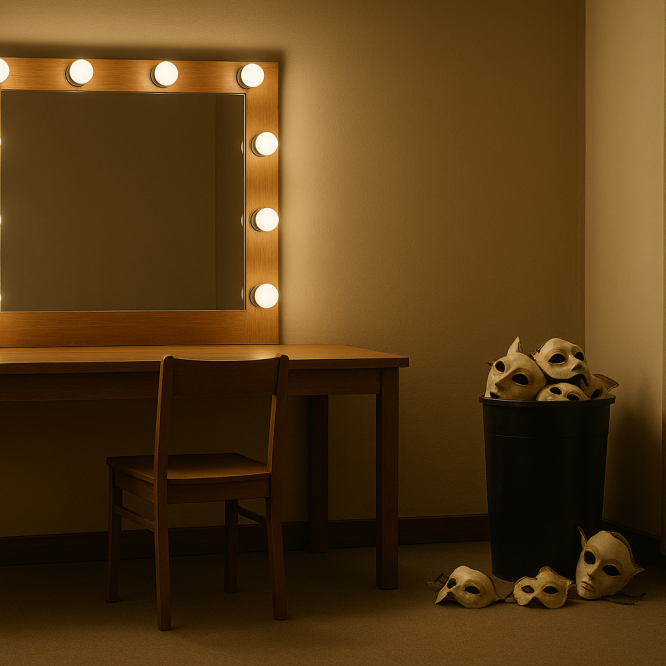If humans had taglines, what would yours be?
If I had a tagline, it wouldn’t be polished by marketing or softened for comfort.
It wouldn’t wrap me in a neat little bow or try to sell you a version of me that goes down easy.
It would call you in—like a mirror, like a match.
And it would say:
Host it. Don’t ghost it.
Five words. One philosophy. All of me.
—
There came a time in my life when there was no longer space for the way my mind worked—no space for the pace, the pattern recognition, the hunger for understanding, the joy I felt when connecting ideas others couldn’t yet see. It wasn’t about being “smart” in the traditional sense. It was about how I processed the world—how I saw meaning in everything, how I absorbed knowledge like oxygen. And for a while, there were places (and people) where I could share that part of myself freely. But slowly, that space began to disappear.
When there’s no one around who can hold space for the core of how your brain works—not just tolerate it, but genuinely engage with it—something begins to shift. Not all at once, but gradually. I started turning inward. I stopped sharing. Then I stopped seeking. Not because I didn’t care anymore, but because it started to feel like there was no point. That silence—the one that forms not just around you, but within you—can become a kind of shield. That’s what I now understand as functional detachment.
(Functional detachment isn’t apathy; it’s survival.)
It’s what happens when connection becomes too risky—or too futile—and your inner world has no landing place. My mind kept moving (faster than ever, maybe), but it no longer had resonance. And when you’re wired for deep connection through ideas, insight, and presence, that kind of isolation doesn’t feel neutral. It feels like erasure.
I don’t hold blame for this—not toward myself, not toward anyone else. This isn’t about fault. It’s about the way we’ve been conditioned: socially, relationally, even neurologically, we’re taught to undervalue the internal worlds of others when we don’t immediately understand them. We’re not taught to co-regulate with difference. We’re taught to simplify, to mirror, to manage. But some of us are wired to see in layers. And when those layers go unseen for too long, detachment feels safer than being perpetually misunderstood.
What I’m learning now is how to gently come back—not just to connection with others, but to the parts of myself I once hid just to survive.
And when you combine that kind of isolation with a head injury… with CPTSD… you create the perfect environment for an internal unraveling. Before any system crashes, there are signs—overload, lag, background errors—but if we never learn to clear the cache, the system does what it must: it shuts down. And for many of us, clearing that cache means something simple but rarely taught—we have to share our internal world. Not to be validated, but to create space.
(Most of us live with at least two versions of ourselves: the one we know, and the one we show.)
Some of us have a different version for everyone we interact with. And when those people show up together, we improvise yet another version—a hybrid shape to manage the room. It’s like having too many apps open, or too many browser tabs—eventually, performance lags. The system slows. And if we don’t pause, reset, or make space? It crashes. Not because we failed. But because no one taught us how to function without fragmentation.
I don’t do that anymore. I’ve learned that the way I optimize—how I find clarity, how I stay present—is by hosting the parts of me I was told to hide. I don’t just tolerate them now; I invite them. I’ve made them part of who I am. I don’t shrink myself to fit anymore. I don’t compress to soothe the room.
We all do that, though, don’t we? We all try to find our shape—but we do it in ways that make others comfortable. When we’re not given space to discover who we are, we default to who others expect us to be. We all have a shape… or at least we’re told we should. But here’s what I’ve come to understand about myself:
I don’t have a shape—not in the traditional sense. I’m not a puzzle piece looking for a slot.
I’m the space that allows others to take shape.
I’m where edges soften, where contradictions breathe, where nothing has to flatten to be real. And in that space… “Host it. Don’t ghost it.” isn’t just a line. It’s how I live.
It’s how I remember myself—and how I make room for others to do the same.
